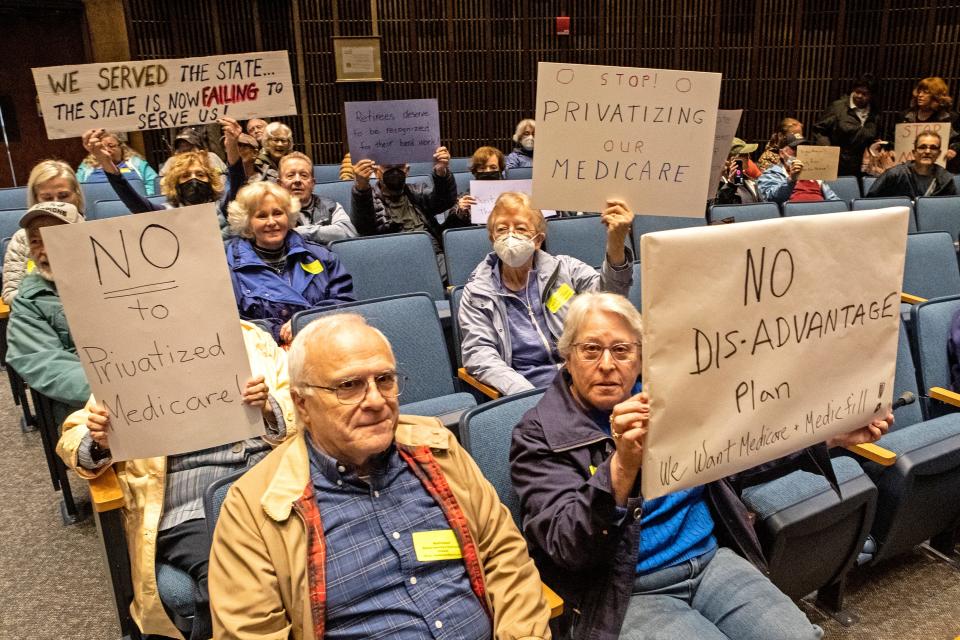Why a seemingly fraught union election has Delaware educators concerned
Editor's note: This story has been updated to include the new date the Delaware State Education Association's executive board will meet to review election challenges and certify results. They will meet on March 4. A retired DSEA member's name was also corrected to Charles "Bud" Clark.
A lack of communication and confusion surrounding the Delaware State Education Association’s recent election has left members concerned over the integrity of the results.
Union president challenger Dawn Alexander and running mate for vice president Tameka Mays said they received numerous calls, text messages and emails from members struggling to locate their ballots for the executive board election. Others did not understand the union’s voting process and had no idea how they would receive a ballot, Mays said.
“Dawn and I were fielding phone calls and text messages and emails from members saying, ‘Where do I go to find my ballot?’” she said. “As much as we could, we were sharing information with them that was shared with us.”
Sabrina Metz, a paraprofessional and local union leader, said one of her colleagues’ mothers, who is a retired teacher, didn’t receive her paper ballot until after voting ended.
“Nobody knew the process, where to go and how to look for it. That’s not fair. Everyone should have the same advantage and opportunity to vote,” said Metz, who filed an election challenge with the DSEA. “These are our dollars; we should have a voice. I feel like people were robbed of their opportunity to have a voice because they didn’t know.”

The fraught election process for Delaware’s largest and, arguably, most powerful employee union has left members unsure of redress and uncertain whether desired change can be achieved, especially in the wake of numerous issues facing Delaware educators and the school system.
Preliminary results shared by candidates for executive office show current union President Stephanie Ingram winning reelection over challenger Alexander. Mays secured the vice president position.
TEACHER PAY:Delaware governor wants to raise teacher salaries up to 9% in the next fiscal year
The executive board will certify the election results at an in-person board meeting at 9 a.m. Saturday, March 4 at Dover High School, according to DSEA members who submitted challenges to the election. The board will also review challenges, for which there are over a dozen, according to sources familiar with the challenges.
Executive Director Jeff Taschner declined to answer any questions regarding the union’s operations and procedures through a spokesperson for this story, claiming it is “a matter of internal union business.” Ingram also declined to comment.
Why some members say they're ready for change
A desire among DSEA members for a change in union leadership began after Taschner voted in favor of changing retirees' benefits to a Medicare Advantage plan.
The switch sparked outcry and led to a group of state retirees filing a lawsuit that temporarily blocked Delaware from implementing the insurance change.
LAWSUIT UPDATE:Judge temporarily blocks Delaware from changing state retirees' health care plan
BACKGROUND:Delaware officials change course, revert to old health plan for state retirees
Charles "Bud" Clark, who retired from the Colonial School District last year, said the union election was particularly important for him.
“I felt like as a retiree I was massively misrepresented by the DSEA with this whole Medicare Advantage health insurance thing,” he said. “I was very interested in getting some different people who would actually represent us and push back against the executive director who … voted for Medicare Advantage.”

Taschner, who is a voting member of the State Employee Benefits Committee, approved the switch to Medicare Advantage, along with the nine other committee members on Feb. 28, 2022, meeting minutes show.
While retired members of the DSEA have a separate executive board, the group appears to share staff with active members of the DSEA, including its executive director. DSEA-Retired's executive board did not respond to email requests for clarity on its organizational structure, nor did the media contact for DSEA.
The change was a recommendation of the State Employee Benefits Committee’s Retiree Healthcare Benefits Advisory Subcommittee, but, according to its online membership list, no retirees or union representatives currently sit on this subcommittee.
At the same time, news broke that the state had quietly taken water samples from schools during the height of the pandemic and withheld those results for over a year, among other issues.
The DSEA did not comment or weigh in on the school water testing until December, sending a letter to the U.S. Environmental Protection Agency echoing calls to investigate the state’s mishandling of the water sampling.
WATCHDOG REPORT:How Delaware's handling of lead water testing put thousands of students and staff at risk
At that point, state officials had already admitted to “missteps” in the lead sampling program’s execution and the federal agency had publicly confirmed it was investigating Delaware’s handling of those efforts.
Blair Catlin Brown, a DSEA executive board member and a school social worker for the Indian River School District, said Alexander’s outspoken efforts on issues like the school lead water testing and education compensation made her an attractive candidate.
“I want someone who is passionate and loud and going to be out there talking about it,” she said of the elevated lead levels in schools. “I really liked Dawn (Alexander)’s passion and organization around running. I was really excited that we might have someone who is really vocal about important things.”
Union helps educators become 'part of the conversation’
The labor movement grew during the Industrial Revolution as American workers sought equal pay, fair working conditions, an end to child labor, reasonable workweeks and other employee protections.
Membership in unions and the organizations themselves have declined over the years, but workers have still found benefits to unionizing. For DSEA members, a united front on issues like autonomy in the classroom and diversity, equity and inclusion are key.
Metz, as an African American woman, said she wants to see DSEA leadership active and involved in diversity and equity efforts.
FOR SUBSCRIBERS:These educators want to change K-12 grading. How a search for fairness echoes in Delaware

Alexander, the union president challenger, also expressed concern over voter access for bus drivers, paraprofessionals and food service workers who may not have easy access to technology.
“The system excludes people who don’t have a home computer,” she said, adding that online voting was not mobile-friendly. “We have created a system where their voice is not heard.”
Giving a voice to the myriad education professionals in public schools beyond teachers was a critical component to Mays running for vice president. She also comes from experience as a paraprofessional for the Colonial School District.
RELATED:How a national teacher shortage is affecting Delaware and what's being done to fix it
Delaware Gov. John Carney’s proposal to increase teacher pay by 9% excludes other critical workers in public schools who are feeling the same “crunch” as teachers, Mays said.
“Ensuring that (education support professionals) are part of the conversation and not a second thought is really important,” she said.
Got a tip? Contact Amanda Fries at afries@delawareonline.com, or by calling 302-598-5507. Follow her on Twitter at @mandy_fries.
This article originally appeared on Delaware News Journal: Delaware educators voice concern over seemingly fraught union election

